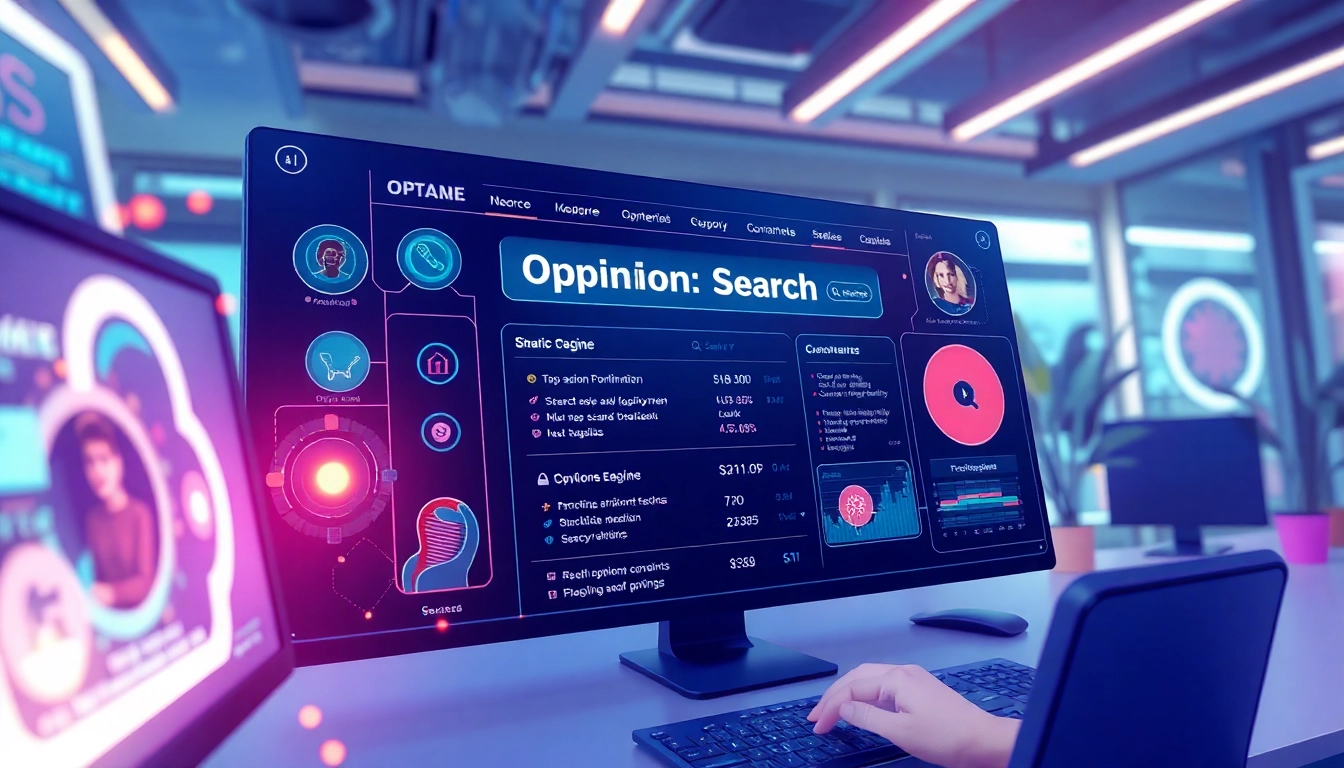Understanding AI Opinion Search
In the fast-evolving landscape of research, methodologies, and sources, the advent of AI Opinion search systems marks a significant shift in how information is gathered and processed. This innovation enables researchers and academics to tap into vast reservoirs of knowledge while filtering insights from diverse perspectives effectively.
What is AI Opinion Search?
AI Opinion Search refers to the technological capability of mining vast amounts of text and data using artificial intelligence algorithms to extract not just facts, but also opinions and sentiments from various sources. Unlike conventional search engines that primarily focus on keyword matches, AI-driven opinion search systems leverage natural language processing (NLP) techniques to understand the context and sentiment surrounding a topic. This form of search is particularly valuable in fields such as academic research, market analysis, and social studies, where the nuances of opinion can significantly impact outcomes and understandings.
How AI Algorithms Work
The backbone of AI opinion search is a combination of several advanced technologies, including machine learning, deep learning, and NLP. These algorithms are trained on large datasets to identify patterns and sentiments associated with varying opinions. Initially, text data is pre-processed to filter out irrelevant information, followed by sentiment analysis where algorithms categorize the extracted opinions as positive, negative, or neutral. This systematic approach enables users to receive comprehensive insights tailored to their research needs.
Importance in Modern Research
The significance of AI opinion search systems in modern research cannot be overstated. As researchers are increasingly required to validate their findings against broader societal opinions, having access to curated, opinion-based data enhances the credibility and relevance of their work. This also democratizes information access, allowing diverse voices to be heard, which is crucial in fostering understanding and collaboration across disciplines.
The Need for AI in Opinion Mining
Challenges in Traditional Methods
Traditional opinion mining methods often fall short due to limitations such as a lack of context understanding and inability to process real-time data efficiently. Researchers typically rely on manual content analysis, which can be time-consuming and prone to human bias. This opens the door for missing critical insights that automation could otherwise easily capture through sentiment analysis and thematic categorization from diverse data sources.
Benefits of AI-Driven Insights
AI-driven insights offer several advantages over traditional methods. Primarily, they provide rapid data processing capabilities, enabling researchers to glean insights from thousands of documents within moments. Additionally, AI-driven systems can analyze data across multiple platforms—academic papers, social media, forums—yielding a comprehensive view of public opinion on any given topic. This capability not only enhances research accuracy but also identifies emerging trends and sentiments that may not yet be prevalent in academic discourse.
Real-World Applications
AI opinion search systems have found application in numerous fields. In healthcare, for example, researchers can analyze patient feedback through AI systems to improve treatment outcomes. Similarly, marketing teams can use AI to track consumer sentiment and refine product positioning. Moreover, policymakers can employ opinion mining tools to measure public response to legislation, ensuring that societal concerns are addressed in decision-making processes.
Key Features of Leading AI Opinion Search Tools
Advanced Natural Language Processing
At the heart of successful AI opinion search tools lies sophisticated natural language processing capabilities. These enable the tools to parse complex language structures, slang, and idiomatic expressions to extract meaningful sentiment and opinion. Enhanced NLP capabilities ensure that users receive valid results that accurately reflect prevailing opinions, while also accommodating the subtleties of human language, which is often laden with emotion and cultural context.
Data Augmentation Techniques
Data augmentation is another critical component of AI opinion search. By enriching input datasets with additional external sources—be it news articles, social media posts, or academic journals—these tools can provide broader perspectives and richer insights. This practice not only mitigates the risk of bias but also accommodates a wider array of voice and opinion, ensuring comprehensive research output.
User-Centric Design Elements
Modern AI opinion search tools are designed with user experience in mind, featuring intuitive interfaces, customizable search parameters, and robust filtering options. This emphasis on user-centric design means that researchers at all levels can efficiently navigate complex datasets and extract relevant insights without needing advanced technical knowledge. Effective training and support resources bolstered by user-friendly design often increase user fidelity and satisfaction with these tools.
Choosing the Right AI Opinion Search Tool
Analyzing User Needs
When selecting an AI opinion search tool, identifying specific user needs is paramount. Researchers must assess what type of data they wish to analyze, the scope of their projects, and their technical capabilities. Tools vary significantly in their specialties; some may excel in academic contexts while others are better suited for market analysis. Conducting a thorough needs assessment ensures that institutions invest in the right solutions tailored for their objectives.
Comparing Services and Features
After determining needs, it’s essential to compare various AI opinion search services and feature sets. Key elements to consider include:
- Data Sources: What type of information can the tool access? Is it limited to academic articles or does it include social media and news?
- Analytics Capabilities: How robust are the analytical tools and outputs? Does the software support advanced statistical analysis?
- User Interface: Is it intuitive? Can users easily customize their searches?
Evaluating tools against these criteria can highlight the most suitable options for your specific research context.
Cost vs. Value Consideration
Cost-effectiveness is a critical concern when selecting an AI opinion search tool. While many tools may offer free trials or basic features at no cost, a comprehensive evaluation of long-term value is necessary. Consider the return on investment through factors such as enhanced research accuracy, time saved in data collection and analysis, and the potential for richer insights. Sometimes, investing in a more expensive, feature-rich tool can yield dividends in research quality and applicability.
Future Trends in AI Opinion Search
Integration with Other AI Technologies
The future of AI opinion search seems poised for further integration with other AI technologies. For instance, combining AI opinion search with predictive analytics can generate forecasts based on current opinion trends. Moreover, blending these tools with visualization technologies can help present complex data in compelling formats, making insights more accessible to a broader audience.
Ethical Considerations
The rise of AI technologies brings forth ethical considerations surrounding data privacy and bias. As AI systems are only as good as the data they are trained on, ensuring statistical assurance and diversity in training datasets is critical. Furthermore, organizations must navigate the complex legalities involved with user data, maintaining transparency and respect for individual privacy throughout the analysis process.
The Road Ahead for Researchers
As AI opinion search technologies continue to evolve, researchers must adapt to harness their full potential. Embracing these tools can provide a competitive edge, ensuring access to deeper insights and facilitating more impactful research outcomes. The convergence of AI capabilities can transform the traditional research landscape, rendering opinion mining a critical part of the scholarly and decision-making processes of the future.



